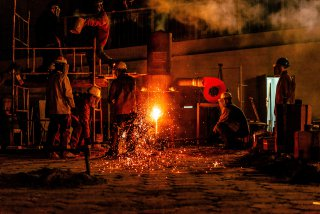
Casting is a manufacturing process that focuses on mass production.
But what does that mean exactly?
Firstly, this has nothing to do with acting or the movie industry. Secondly, it means that casting is a type of engineering process that enables manufactures to create complex parts economically. What's more, this process is very quick in comparison with alternative methods for creating these same materials which involve cutting, shaping and more rigorous work.
As for the specifics, casting takes liquid or molten-state materials and then pours them into a particular mold in which they solidify. Afterward, the solidified material is taken out of the mold and ready to be used for a designated purpose.
In case you might be wondering, this also means that casting can take various parts from different industries and use them to create a specific material and design. From plastic toys to turbine blades, there is really no end of materials that can be melted down and used during the casting process.
And that's just part of the story...
About Choosing from the Different Types of Casting
Plaster casting, sand casting and die casting are just a few types of hot forming castings that provide excellent benefits in terms of fabrication. However, there are certain factors to consider when manufacturers need to decide between one type of casting and the next. Here are some of the most pressing issues which need to be taken into account before proceeding with a type of casting:
Manufacturing Cost - Each type of casting will incur a different cost and depending on the size of production, manufacturers will sometimes choose plaster casting over the likes of sand casting.
Production Material - The type of material will always play an important role in terms of choosing a particular casting. Manufacturers are the experts and people to ask when making this decision.
Surface Finish - Some casting techniques will produce a shiny surface and others will have a much more rugged or grain-like finish. Either way, the type of casting will determine the outcome.
Quantity - The size of the production needed will often lead manufacturers to lean toward a more economical type of casting. That being said, the buyer will have the final say on what they prefer.
Accuracy - Some types of casting are more accurate in terms of dimensions and this can also determine what techniques should be used for the process.
Needless to say, these are just a few considerations that buyers and manufacturers need to take into account when deciding on a specific type of casting. And every circumstance or requirement is different which places further importance on manufactures in terms of giving advice on the process.
Conclusion
Casting refers to various engineering processes that enable manufacturers to mass produce certain materials. Although these processes are economical and flexible, they are also incredibly fast in comparison with traditional methods that involved the likes of shaping and cutting. While most people think of acting and movies when they think of casting, you should see that casting is just as important to manufacturers as choosing the right actor might be for the perfect movie.
© 2026 NatureWorldNews.com All rights reserved. Do not reproduce without permission.





